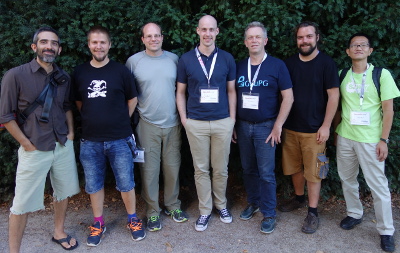# a month of # # needed #
#+ # in one-time donations #
## Supporters #
# #+END_HTML # # To use it the code at "Campaign data" below needs to be adjusted as # well. # =================================================================== set -e LD_LIBRARY_PATH=/usr/local/lib export LD_LIBRARY_PATH usage() { cat <| Month | \n"; printf "# | \n"; printf "€ | \n"; printf "
|---|---|---|
| %d | \n", thisyear; printf "%d | \n", nyear; printf "%d |
GnuPG Spendenkampagne
pro Monat von benötigten
+ an einmaligen Spenden
Unterstützer
Für jede Dauerspende wird First Look Media, der Dachverband von The Intercept und Laura Poitras Field of Vision, innerhalb der ersten 12 Monate den - gleichen Betrag noch einmal spenden (bis zu - 25 000 USD)! + gleichen Betrag noch einmal spenden ( + von 25 000 USD erreicht)!
Video des Tages: John Pershing 1010data
Jeden Tag gibt es ein neues Video! Im Menü können weitere Videos ausgewählt werden.
GnuPG Braucht Ihre Hilfe!
Seit 20 Jahren hilft GnuPG elektronische Kommunikation zu
schützen.
Cindy
Cohn , Geschäftsführerin der
Electronic Frontier
Foundation (EFF), beschreibt GnuPG als “das Werkzeug, mit dem ich am
häufigsten mit Menschen in Not [..] kommuniziere.”
Sheera
Frenkel
, Geschäftsführerin der
Electronic Frontier
Foundation (EFF), beschreibt GnuPG als “das Werkzeug, mit dem ich am
häufigsten mit Menschen in Not [..] kommuniziere.”
Sheera
Frenkel ,
Auslandskorrespondentin für BuzzFeed News, fügt
hinzu: "Als eine Nachrichtenorganisation sind
wir ausgebildet GPG zu benutzen. Es geht um die
Quellen und was mit ihnen passiert wenn man ihr Land
verlässt, die brisante Story veröffentlicht und die
Regierung nach dem Informant sucht, der einem die
Schlüsselinformation verriet." Und GnuPG war
bekanntermaßen Edward Snowden's Werkzeug der Wahl um
sicher Journalisten über die Massenüberwachung der NSA zu
unterrichten.
,
Auslandskorrespondentin für BuzzFeed News, fügt
hinzu: "Als eine Nachrichtenorganisation sind
wir ausgebildet GPG zu benutzen. Es geht um die
Quellen und was mit ihnen passiert wenn man ihr Land
verlässt, die brisante Story veröffentlicht und die
Regierung nach dem Informant sucht, der einem die
Schlüsselinformation verriet." Und GnuPG war
bekanntermaßen Edward Snowden's Werkzeug der Wahl um
sicher Journalisten über die Massenüberwachung der NSA zu
unterrichten.
Aber GnuPG wird nicht nur zum Verschlüsseln von E-Mails
benutzt. GnuPG schützt
Softwareaktualisierungen auf fast allen freien
Betriebsystemen, die
auf zwei
drittel aller Server im Internet eingesetzt werden.
Weiterhin wird GnuPG von einer breiten Masse an
Organisationen und Firmen verwendet. Arthur
Jordan , Vizepräsident der IT
von 2U, hat uns beispielsweise erzählt:
"als wir Universitäten kontaktierten um zu fragen, wie
sie sicher Dateien übertragen, stellten wir fest, dass sie
bereits mit GPG verschlüsselten."
, Vizepräsident der IT
von 2U, hat uns beispielsweise erzählt:
"als wir Universitäten kontaktierten um zu fragen, wie
sie sicher Dateien übertragen, stellten wir fest, dass sie
bereits mit GPG verschlüsselten."
Trotz der kritischen Rolle die GnuPG insbesondere für Journalisten, Aktivisten und Anwälte, aber auch für jede Nutzerin des Internets spielt, hatte GnuPG im Jahr 2012 Finanzierungsprobleme. Aufgrund von ausbleibenden Aufträgen musste Werner Koch, GnuPG's Hauptentwickler, seinen einzigen Mitarbeiter entlassen, der Vollzeit an GnuPG gearbeitet hat. Und im Jahr 2014 musste Werner andere Jobs annehmen um seine Arbeit an GnuPG zu finanzieren.
Die Situation war so hoffnungslos, dass Werner kurz davor stand aufzugeben. Aber Freunde haben ihn überzeugt, es mit einer Spendenkampagne zu versuchen. Die Reaktion war überwältigend. Nicht nur hat er genug Geld erhalten um seinen Lebensunterhalt zu finanzieren, er bekam 250 000 Euro in kleinen Spenden, und Stripe, Facebook und die Linux Foundation haben zugesagt, je etwa 50 000 Euro pro Jahr zu spenden.
Ermutigt von der überwältigenden Hilfsbereitschaft hat Werner entschieden sein Team zu vergrößern. Bis zum heutigen Tag hat er fünf Entwickler eingestellt, und über die letzten zwei Jahre hat sich GnuPG und das dazugehörende Ökosystem in einer Reihe von Punkten weiterentwickelt. Zum Beispiel haben wir das Finden von Schlüssel vereinfacht, ein System zur Anbindung von GPG an Python adoptiert, an Enigmail mitgearbeitet, und das Gnuk Projekt unterstützt—einem Sicherheits-Token bestehend aus Freier Software und Freier Hardware.
Wir möchten diese Arbeit auf lange Zeit fortsetzen. Aber wir wollen, dass unsere Loyalität in erster Linie der Allgemeinheit gehört. Deshalb wollen wir sicherstellen, dass der Großteil der Finanzierung von Individuen und nicht von Firmen kommt. Weiterhin setzen wir um das Bestehen des Projektes auf lange Sicht zu gewähren auf regelmäßige Spenden und nicht auf einmalige Spenden wie letztes mal.
Unser Hauptziel ist es, Spenden in Höhe von 15 000 Euro monatlich zu bekommen—genug um drei Entwickler zu finanzieren. Wir können dieses Ziel erreichen wenn nur 2000 Menschen zwischen 5 und 10 Euro monatlich spenden, dass entspricht etwa zwei oder drei Tassen Kaffee.

Das Gnuk Token
Unser erweitertes Ziel ist die doppelte Menge an Spenden. Wenn 4000 Menschen nur fünf oder zehn Euro jeden Monat spenden, werden wir unser Team vergrößern und mit ihnen Projekte im GnuPG Ökosystem unterstützten. Ein Projekt, an dem wir wirklich gerne mitarbeiten möchten, ist GPGTools, auf das sich viele Aktivisten und Journalisten verlassen um ihre Onlinekommunikation zu schützen. Wir wollen sicherstellen, dass die GPG-Integration für das Mailprogramm von Apple unterstützt ist sobald eine neue Version von macOS erscheint.
Vielleicht benutzen Sie nicht GnuPG um Ihre E-Mails zu verschlüsseln. Nichtsdestotrotz verlassen sich Journalisten deren Arbeit Sie schätzen auf GnuPG um ihre Quellen zu schützen, verlassen sich Aktivisten die für eine Sache kämpfen die Sie unterstützenswert finden auf GnuPG um ihre Kommunikation zu schützen, und verlassen sich Anwälte die mit ihren Klienten verkehren auf GnuPG um ihrer Verschwiegenheitspflicht in unserer digitalen Welt nachzukommen. Weiterhin verlassen sich Betriebsysteme basierend auf Freier Software auf GnuPG um ihre Softwareaktualisierungen zu verifizieren.
Falls Sie —wie wir— überzeugt sind, dass diese Arbeit essenziell ist um Demokratie und Privatsphäre zu schützen, dann helfen Sie uns bitte unsere Arbeit fortzusetzen und unabhängig zu bleiben.
Was andere über GnuPG sagen
Wer wir sind








 können weitere Videos ausgewählt werden.
können weitere Videos ausgewählt werden.

 Gnuk
Gnuk










